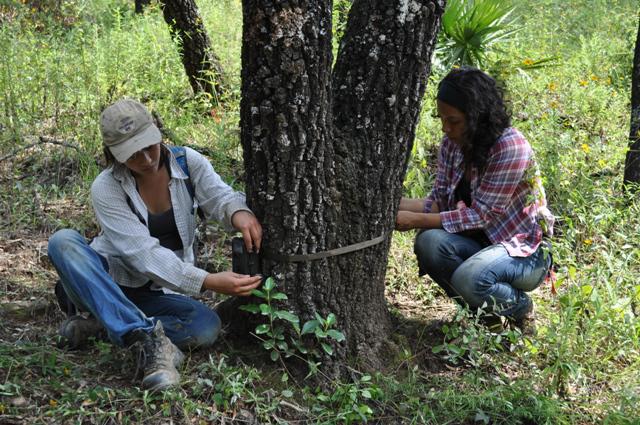Juan Luis Peña-Mondragon
Other projects
23 Nov 2010
Evaluation of Livestock Depredation by Jaguar and Other Large Carnivorous Mammals in Southern ‘Gran Sierra Plegada’
The objective is to characterize the livestock management as a factor that triggers livestock depredation by jaguars and domestic animals and other large carnivores in northeast Mexico.

Installing the camera trap.
Predation of livestock by wild cats is a very important conflict the human population has with carnivores. Although loss and fragmentation of habitat and hunting, contribute to this conflict, when ranchers have losses or they know a wild animal is near their lands, they perceive a threat and consequently retaliate on the carnivores. In this project we are mainly interested in the conflict with jaguars in the northeast of Mexico. Livestock in Mexico is largely a subsistence activity which makes the problem challenging since rural peoples are mainly poor and unless interventions do take into account their livelihood needs, the conservation of jaguars and other species will continue facing failures and disappointments. We documented in the first phase caused by jaguars to rural peasant families in north-eastern Mexico and found these were relatively low.
However, results showed also that livestock predation was caused not only by jaguars but also by other predators (such as cougar, black bear, coyote and bobcat). Other factors such as weather conditions (floods and / or droughts), livestock theft, lack of animals’ health management programs and reproductive and genetic assistance are also factors that affect the economy of rural families. Based on all these, we are interested in working the problem of conservation of jaguars from a social-ecological perspective. A first issue to analyse is rural people livestock practices and evaluating damages from an economic perspective. Getting to know also their perceptions regarding the species and its role in the ecosystem is another topic that will give us a deeper insight into the problem. We believe that working with the social actors affected directly by depredation will allow the construction of alternative management strategies that mitigate peoples’ economic losses and that will diminish and eventually stop the elimination of these important species.